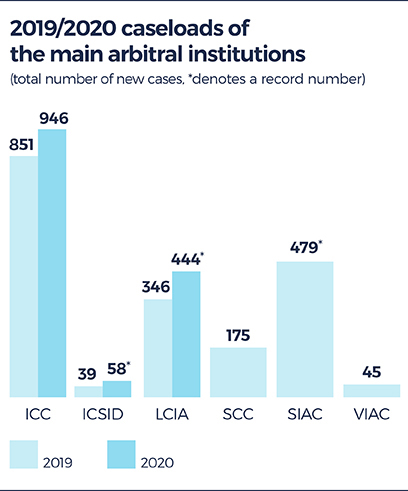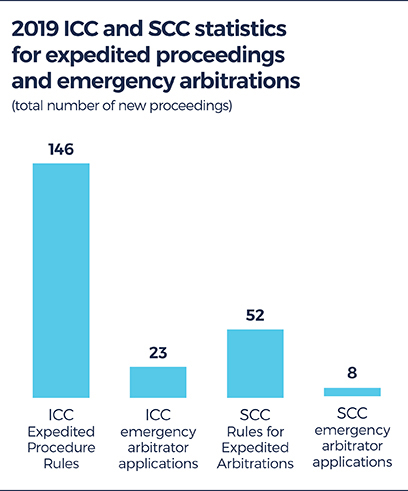International arbitration in 2021
Latest arbitral rules reforms
Facilitating shorter, cheaper virtual arbitrations
Driven by COVID-19 restrictions and user demands, arbitral institutions are arming tribunals with improved case management tools to deliver faster decisions, conduct remote proceedings and lower the cost of international arbitrations.
The COVID-19 pandemic has ushered in a new era of remote work and international arbitration is no stranger to this new reality. Contactless proceedings, whether fully virtual or under a hybrid model, are here to stay and will continue to be a feature of international arbitration practice in 2021, buoyed by advances in virtual hearing and electronic document management technologies. Responding to the global challenges posed by lockdowns, as well as to calls for greater expediency, transparency and cost-efficiency, leading arbitral institutions such as the ICC and LCIA have been taking steps to streamline their arbitration procedures. And other institutions such as ICSID, SIAC and DIAC Are also in the process of revamping their rules to meet the demands of the moment.
The recently adopted ICC and LCIA Rules, as well as the ongoing ICSID amendment process, shed light on four key global themes that will set the tone for further institutional reforms in 2021 and beyond.
- Summary dismissal, fast-track arbitrations and stricter time limits to issue awards. Most arbitral institutions already allowed for some form of expedited and reduced-cost arbitral Some of the more recent reforms aim to expand access to such proceedings and impose stricter deadlines for tribunals to issue awards. For example, the new ICC Rules, which became effective in January 2021, have expanded the scope of application of such proceedings by increasing the threshold to opt out of expedited arbitration from $2m to $3m (amount in dispute). And under the latest iteration of the proposed ICSID Rules (Working Paper No. 4), parties will be able to opt in to expedited arbitration. In turn, the LCIA Rules, which came into force in October 2020, expressly recognise tribunals’ authority to issue an order or award summarily dismissing claims that are manifestly without merit. And in a bid to reduce the average time it takes tribunals to issue their awards, the draft ICSID Rules currently establish an eight-month time limit from the last written or oral argument. Unlike the current ICC guidelines, however, which empower the ICC Court to reduce arbitrators’ fees if they are unjustifiably late, the ICSID stipulation is a ‘best efforts’ one and does not set forth any penalties should a tribunal fail to issue its award within the prescribed eight months.
- E-friendly and remote arbitrations. In the COVID-19 era, some of the most notable innovations are designed to allow ongoing and new arbitrations to be held The recent LCIA and ICC reforms have refined and expanded their provisions on virtual or hybrid (semi-virtual) hearings, removing any ambiguities as to their feasibility or legality, and in some cases even empowering tribunals to order them regardless of a party’s opposition. Notably, these institutions have now embraced electronic communications and filings as the default rule, eliminating the need to submit hard copies, a welcome development that will help save costs and reduce the carbon footprint of arbitration proceedings.
- More room for joinder and consolidation of proceedings. In tandem with other reforms to promote efficiency, both the LCIA and the ICC have made it significantly easier to conduct multi-party arbitrations by broadening their rules on joinder and consolidation. The 2021 ICC Rules go as far as to allow the consolidation of proceedings involving claims between the same parties but under different arbitration agreements.
- Increased transparency. Heeding the call for greater transparency in both commercial and investment arbitrations, the new ICC and ICSID Rules require parties to disclose the existence (albeit not the terms) of any third-party funding agreement to avoid conflicts of interest between funders and Along the same lines, the ICC Rules allow for greater scrutiny of any changes of counsel throughout the duration of the proceedings and empower the tribunal to exclude newly appointed party representatives should their involvement create a conflict of interest. The LCIA Rules, in turn, now expressly regulate the role of tribunal secretaries.

We expect that these amendments will boost the continued and significant growth in the number of disputes resolved by international arbitration, and in the use of fast-track arbitration. Parties have more options to resolve their disputes in a faster and more cost-effective way and tribunals are empowered with a greater range of tools to ensure the arbitral process moves swiftly and efficiently, even in the face of an obstructive party.

The popularity of international arbitration appears to be growing. Evidence suggests that 2020 was a record-setting year for many arbitral institutions which saw their caseloads spike. The number of expedited proceedings and emergency arbitrations is also on the rise. The ICC recorded a total of 946 new cases in 2020 – the highest number registered since 2016 – while the LCIA and ICSID reported their highest ever number of cases.

The recent changes to arbitration procedure are aimed at promoting the efficient conduct of arbitrations. Over the last few years, the procedural toolbox available to arbitral tribunals has been expanded with a view to balance procedural efficiency with fundamental procedural principles, most importantly the right to be heard and the equal treatment of all parties. At the same time, the COVID-19 crisis has reshaped the way parties, arbitrators and counsel go about dispute resolution. Arbitration as a flexible mechanism of dispute resolution is well placed to address the changing needs of stakeholders in that process.
The primacy of electronic communication and the option for remote hearings, which have gained popularity during the pandemic, are expected to stay and to lead to a more sustainable international arbitration process for years to come.
International arbitration in 2021
- Introduction
- The future of remote hearings in a post-pandemic world
- COVID-19-related disputes: trends and predictions
- Insolvency and arbitration
- Arbitration in the EU and UK: a changing landscape
- The future of investor-State dispute settlement
- Investment arbitration trends
- Investment claims: project finance lenders have rights too
- Latest arbitral rules reforms
- Continuing economic woes for the construction and infrastructure sectors
- Arbitrators’ duties of disclosure in the spotlight
- Arbitration and climate change


